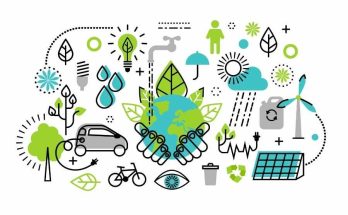By Alejandro Angulo
Côte d›Ivoire (Ivory Coast) is the host country for World Environment Day on June 2023. The theme for 2023, announced by the United Nations Environment Program (UNEP), is plastics pollution. This year marks the 50th anniversary of Environment Day, established in 1972 by the General Assembly of the United Nations.
However, every year we have witnessed more pollution in all directions. Climate change has not been mitigated, the loss of biodiversity continues, does the water crisis. All of this leads us to think that we are on a trajectory of collapse, and all due to human influence. The Stockholm Resilience Center (SRC), together with an international group of scientists have defined what they call the nine planetary boundaries. This is based on processes that regulate the stability and resilience of the planet. If these boundaries are exceeded, there are serious doubts about the continuity of human development without ecosystem collapse. These boundaries are: stratospheric ozone depletion, aerosol pollution, ocean acidification, biogeochemical flows, freshwater and land use change, biodiversity, chemical and new element pollution, and climate change.
According to the latest studies published by the SRC, only three of these parameters have not been exceeded. One of them, the hole in the ozone layer, has been positively controlled by human action. However, it is still close to the limit of irreversibility, and we should remain vigilant. A lessening of plankton, augurs less future CO2 uptake. The third factor, pollution, is simply an unknown because a sustainable threshold has not yet been defined. The remaining six parameters have already exceeded their thresholds. The consensus of scholars is that the “ecological footprint” of human activity exceeded the planet’s bio-capacity for regeneration around the 1970s, or at most the early 1980s. This is the same as spending more money than one’s salary, using credit which sooner or later forces correction.
The growing populations in search of new opportunities puts enormous pressure on the planet and on cities. It is of such magnitude that the great global challenge is currently in terms of avoiding the «multiorganic» collapse of the system with effective measures that allow the responsible interaction of the inhabitants with the environment and its conservation. It is necessary to establish the growth limits of the habitat, delimiting the maximum number of homes in coordination with road infrastructure, water availability, pollutant removal, CO2 capture, waste management, and mobility.
In a recent report, the World Bank states the following: More than half of the world GDP is generated in sectors that depend to a large or moderate extent on ecosystem services, such as pollination, filtering of water, and raw materials. More than three billion people depend on coastal and marine biodiversity for their protein intake and livelihoods. Three quarters of the world’s 115 major food crops rely on animal pollination. In developing countries, forests, lakes, rivers, and oceans provide a significant proportion of food, fuel, and household income. They constitute an invaluable social safety net in times of crisis, particularly for the poor living in rural areas. These essential natural assets are increasingly compromised, as 60-70% of the world’s ecosystems are degrading faster than they can recover. Inadequate management of the environment and natural resources leads to considerable economic losses. For example, an estimated US$80 billion a year are wasted due to mismanaged ocean fisheries. Air pollution is the main environmental risk to health, costing the equivalent of 6.1% of global GDP per year. One million animal and plant species, out of an estimated total of 8 million, are in danger of extinction, many of them within 10 years. This is according to the latest report from the Intergovernmental Science-Policy Platform on Biodiversity and Ecosystem Services (IPBES). Since 1970, 14 of 18 categories of ecosystem services have been reduced.
Likewise, it is estimated that environmental air pollution, both in cities and in rural areas, was the cause of 4.2 million premature deaths worldwide per year. This mortality is due to exposure to small particles 2.5 microns or less in diameter (PM2.5), which cause cardiovascular and respiratory diseases, and cancer. According to recent reports, China, the United States, India, and Russia are the countries that pollute the most, since they emit 55% of the world’s CO2. In Mexico, as of 2022, the most polluted cities are: Monterrey, Toluca, Salamanca, León, and Irapuato.
I leave you some of the following recommendations to offer solutions to the environmental problem. Replace desired items with reusable items. Avoid using plastics. Conserve water and electricity. Support environmentally friendly practices, such as planting a tree. Reduce household waste. Take tours on foot, by bike, and/or shared rides. Recycle waste to conserve natural resources. Eliminate the use of polluting chemicals. Reduce polluting noise. Reduce CO2 emissions in our daily work.




